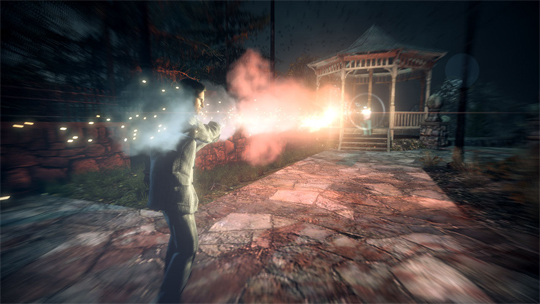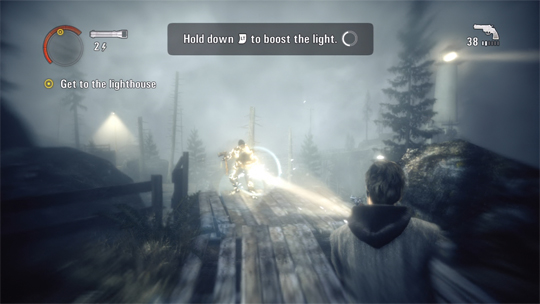A light shines faintly in the distance. The forest is dark and the fog envelops you. Instinctively, you know that you must head toward the light. If you know nothing else about your surroundings, your friends, your foes, or yourself, you do know at least one thing is true: Go into the light. Like a child in his room at night, the light can protect you from the monsters, from anything. But also like a child, you eventually grow to understand the reality of your fears, and the darkness is suddenly less frightening, less ominously secretive; the only thing left taunting you is the incoherent complexity of your nightmares.
Alan Wake is "a little heavy on the metaphors," says supporting character Sarah Breaker in Remedy Entertainment’s highly anticipated third-person thriller. The same might be said of the game’s writer, Sam Lake, who has crafted a wildly imaginative, captivating, enjoyable, yet frustrating plot for the studio’s first game since the 2003 pulp shooter, Max Payne 2. When the literary technique is on, it works wonderfully, sustaining the story for at least half of its arc, depending on how one reads into it. But as the opening lines of the game — "…nightmares exist outside of logic, and there’s little fun to be had in explanations…there can be no explanation, and there shouldn’t be one…" — suggest, there may be no correct interpretation for the nightmarish mess in which author Alan Wake becomes entangled over the course of six short "episodes."
Although it seems that any type of cohesive logic applied to the game’s narrative breaks down and falls apart at some point or another, sections of the plot make it a stellar title with one of the best first halves I’ve experienced in some time. This instantly captivating experience began to lose some of its magic in the second half, largely because of the demystification of the events surrounding Wake’s retreat to Bright Falls: his wife’s disappearance, the strange darkness possessing his enemies, the lapse in his memory, etc. The abstract seemed to become more concrete, and what I initially pegged as strictly psychological shifted more and more toward the supernatural. These changes were slightly disappointing and disenchanting, but even after finishing the game, a substantial degree of ambiguity still plaguing my perception of the experience tells me that the story is at least impressive, if not exceptional. Again, from the game’s opening lines: "The unanswered mystery is what stays with us the longest, and it’s what we’ll remember in the end."

The one-paragraph, non-spoiler-free plot is ostensibly about an author with writer’s block who comes to a small town in the Washington mountains to clear his head and calm his nerves, but instead winds up staying on an island that has been gone for over 30 years, where his nyctophobic wife is kidnapped by a Dark Presence lurking in the volcano below, which has been awakened by his arrival. He then spends a week in the non-existent cabin, writing a manuscript edited by the Dark Presence in an attempt to save his wife, the content of which penetrates the real world and plays out exactly as it is written, casting him in the role of a semi-amnesiac, nearly narcoleptic protagonist fighting the aforementioned evil with light, occasionally receiving aid via dream sequence from a man in a diver’s suit who has been dead for as many years as the imaginary island. But it’s not exactly as simple as that.
The early part of the game is about learning the story, revealing the reality of Alan Wake’s situation, so stingily pieced together by scattered, non-sequential manuscript pages. Alongside plenty of deadpan narration that explores events, expectations, and emotions, the manuscript pages expand on character development, gameplay elements, and overall plot. They subtly knock on the fourth wall, and tell a meta-narrative that recapitulates what the player has already seen, predicts future events, and at times describes Wake’s current situation: "He took out his hip flask when he reached the page that described how he reached the page that made him take out his hip flask." The player is driven to find these pages because Wake is driven to reveal what is happening to him. The pages feel like more than just cleverly tied-in collectibles; they are integral to the experience. As the secrets are revealed, however, the journey becomes more about just "getting there," reaching a prescribed goal rather than unfolding the plot. This shift is not a bad thing, but may have happened too early in the game’s timeline, leaving the second half to drag its feet in terms of depth and allure.
Otherwise, the game is paced incredibly well, remaining consistently compelling throughout the mix of cutscenes, combat, exploration, and narration. Wandering throughout the majestic mountain forests of the pacific northwest as the atmosphere vacillates between serene and foreboding dominates the experience, with intermittent moments of tense, frightful combat, and driving segments that surprisingly don’t detract from the rest of the game. These remain short enough to not be intrusive, and don’t abandon the core gameplay, instead allowing Wake to step out of the vehicle and go on foot any time something in the environment interests him.

Combat, for the most part, is used very effectively to add to the overall experience. For the majority of the game, there is just enough to stress players into a state of alert, but rarely enough to become monotonous. One could argue, though, that the greater frequency of fights late in the game dampen the sense of suspense built earlier on. Conflicts are almost always foreshadowed by a change in atmosphere, which becomes increasingly dark, foggy, and obscured by blur effects before darkness-possessed locals called "Taken" quickly close in on Wake. The game uses a tight and responsive two-tiered combat system that requires Wake to cast away his enemies’ shrouds of darkness with flashlights or road flares before dispatching them with hard ammunition. The flashlight has an excellent lock-on function and its persistent beam acts as a natural reticle for Wake’s guns. Other weapons like flashbang grenades and flare guns, items usually considered secondary in video games, are now deadly, and quickly dematerialize even Wake’s tougher opposition.
Encounters become increasingly formidable as the game progresses, as stronger Taken attack in greater numbers with more dangerous weapons, and inanimate objects propel themselves across the landscape in attempts to pulpify the protagonist. This demands the use of improved light sources (e.g. spotlights, headlights) and weaponry, but also makes flight an appealing option more often than in most games. Because there is nothing to gain from killing enemies aside from peace and safety, simply running to the next protective light source can be preferable to annihilating every last foe in the middle of the dark woods.
Relentless forward progress is encouraged in Alan Wake, tying into the author’s description of how he must keep writing, lest he fail to save his wife. The beacons of light that dot each level provide Wake safe haven from his enemies and always show him where to go next, but also burn out as he passes them, ensuring that the only path to safety is ever ahead, not behind. Retreat is never an option, a theme that is further emphasized by the bridges that continually collapse behind Wake, leaving him to advance across the next figurative island in his disturbingly disjointed nightmare reality.
Alan Wake is a great game with nearly all of the elements one should expect in a thriller. Whether it cleverly incorporates literary technique into videogame storytelling or intentionally obfuscates any true meaning just to harass players is a mystery, but it does start one thinking, and that’s an important step for the medium. Otherwise, inventive and effective gameplay mechanics combine with excellent art and sound design to make what is an enjoyable game, regardless of the intellectual (or pseudo-intellectual) stuff.


















